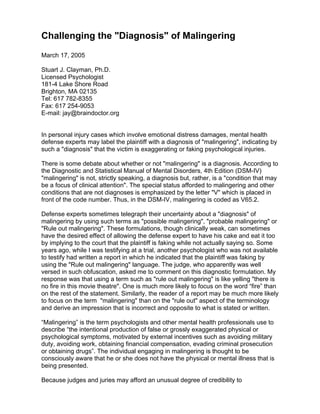
Challenging "Malingering
- 1. Challenging the "Diagnosis" of Malingering March 17, 2005 Stuart J. Clayman, Ph.D. Licensed Psychologist 181-4 Lake Shore Road Brighton, MA 02135 Tel: 617 782-8355 Fax: 617 254-9053 E-mail: jay@braindoctor.org In personal injury cases which involve emotional distress damages, mental health defense experts may label the plaintiff with a diagnosis of "malingering", indicating by such a "diagnosis" that the victim is exaggerating or faking psychological injuries. There is some debate about whether or not "malingering" is a diagnosis. According to the Diagnostic and Statistical Manual of Mental Disorders, 4th Edition (DSM-IV) "malingering" is not, strictly speaking, a diagnosis but, rather, is a "condition that may be a focus of clinical attention". The special status afforded to malingering and other conditions that are not diagnoses is emphasized by the letter "V" which is placed in front of the code number. Thus, in the DSM-IV, malingering is coded as V65.2. Defense experts sometimes telegraph their uncertainty about a "diagnosis" of malingering by using such terms as "possible malingering", "probable malingering" or "Rule out malingering". These formulations, though clinically weak, can sometimes have the desired effect of allowing the defense expert to have his cake and eat it too by implying to the court that the plaintiff is faking while not actually saying so. Some years ago, while I was testifying at a trial, another psychologist who was not available to testify had written a report in which he indicated that the plaintiff was faking by using the "Rule out malingering" language. The judge, who apparently was well versed in such obfuscation, asked me to comment on this diagnostic formulation. My response was that using a term such as "rule out malingering" is like yelling "there is no fire in this movie theatre". One is much more likely to focus on the word “fire” than on the rest of the statement. Similarly, the reader of a report may be much more likely to focus on the term "malingering" than on the "rule out" aspect of the terminology and derive an impression that is incorrect and opposite to what is stated or written. “Malingering” is the term psychologists and other mental health professionals use to describe “the intentional production of false or grossly exaggerated physical or psychological symptoms, motivated by external incentives such as avoiding military duty, avoiding work, obtaining financial compensation, evading criminal prosecution or obtaining drugs”. The individual engaging in malingering is thought to be consciously aware that he or she does not have the physical or mental illness that is being presented. Because judges and juries may afford an unusual degree of credibility to
- 2. 2 psychologists and other doctors, a mental health defense expert who believes that the plaintiff is faking should state so clearly and unambiguously and offer the best available substantiation for such an opinion. In my view, an opinion that a plaintiff has engaged in malingering must be based, at least in part, upon objective psychological testing. The objective psychological test or tests utilized must contain "validity scales" which are special functions that are built into the psychological test that allow the expert to scientifically assess the attitudes with which the plaintiff has approached the test. One psychological test that contains these special "validity" scales is the Minnesota Multiphasic Personality Inventory. The MMPI-2, as it is now known, has been described as the "Cadillac" or "gold standard" of objective psychological tests and is also a standard against which other tests of malingering are measured. The MMPI-2 contains 567 true-false questions and is able to yield scores on approximately 100 scales that are used to determine, for example whether the test-taker is anxious, depressed or likely to present symptoms of Posttraumatic Stress Disorder or many other neurotic or psychotic conditions. More importantly, for this discussion, the MMPI-2 is able to provide objective and scientifically based information about whether an individual has responded honestly to the test, or whether he or she has attempted to exaggerate or minimize psychological problems, perhaps in order to obtain an external incentive, such as money damages in a personal injury lawsuit. In personal injury litigation, disability and worker's compensation claims, the test- taker may have an incentive to appear more seriously psychologically disturbed than is the case. Research studies have consistently shown that the MMPI-2's F (Infrequency) Scale, which consists of 60 special test items, can reliably identify the tendency of some test-takers to exaggerate psychological problems. Berry, Baer and Harris (1991) analyzed the data from 28 studies of malingering on the MMPI and found that most of the studies supported the MMPI's ability to detect faking. Schretlen (1988) reviewed the research findings for the use of psychological tests in detecting malingering and reported that the MMPI was valuable for this purpose. He concluded that "it is probably indefensible to render expert testimony regarding the likelihood of malingering without psychological test data bearing on this question". When mental health defense experts offer testimony that a plaintiff is exaggerating or faking mental problems, that expert should be carefully cross-examined regarding the basis for such claims.